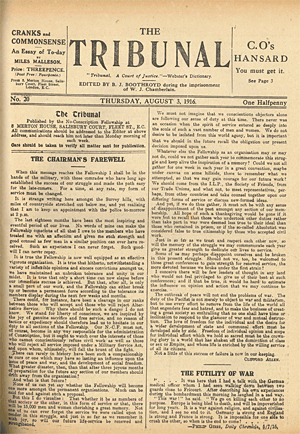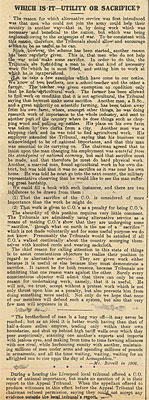
| HOME | TRIBUNAL HOME |
THE TRIBUNAL information series
August 1916
July’s Tribunal issues were wracked by crisis and indecision. With the advent of the Home Office Scheme, whereby Conscientious Objectors in Prison could be moved to work camps designed at least ostensibly to put them to useful labour. Whether to agree to the scheme or not was a question put individually to each Conscientious Objector, but the Tribunal had already decided to spread the No-Conscription Fellowship’s (NCF) official line: No to the Home Office Scheme.
The Tribunal, as we saw in July, published propaganda to this end, but there was still no consensus. COs and their supporters were beginning to disagree over what a “true” Absolutist CO was and the Tribunal - already marginalising the men who had taken up the Non-Combatant Corps - was in danger of throwing it’s weight behind an ever decreasing minority of Conscientious Objectors.
Circumstances played into the NCF’s favour, as the first article of our monthly study of the Tribunal shows.
3rd August - The Chairman’s Farewell
Not all circumstances that worked in the NCF’s favour during the war were positive. The August 3rd issue is dominated by this article - “The Chairman’s Farewell”. The final free words of Clifford Allen, written before being handed over to the military there to enter the cycle of prison, punishment and temporary release for the rest of the war. Allen had been featured many times in the pages of the Tribunal as the Chairman of the NCF and this, combined with his tireless work giving speeches, producing letters, leaflets and other pro-CO propaganda would have made him a familiar figure to the readership, whether they were NCF members or not.
dominated by this article - “The Chairman’s Farewell”. The final free words of Clifford Allen, written before being handed over to the military there to enter the cycle of prison, punishment and temporary release for the rest of the war. Allen had been featured many times in the pages of the Tribunal as the Chairman of the NCF and this, combined with his tireless work giving speeches, producing letters, leaflets and other pro-CO propaganda would have made him a familiar figure to the readership, whether they were NCF members or not.
The article is an impassioned call for a united front no matter the disagreements over the Home Office Scheme that had threatened to engulf the CO movement. Allen doesn’t lecture or harangue, but writes in a pleasant, conciliatory tone (I wish I could be as eloquent!):
“There could, for instance, have been a cleavage in our ranks between those who will accept and those who will reject alternative service. Why there should be a danger I do not know”
It makes the qualms and quibbles over “Alternativism” and the Home Office Scheme seem rather minor. Not dismissive of any attitude, but instead reminding readers of a greater kinship between them. Alternative service or willing return to prison, a Conscientious Objector was still a Conscientious Objector and uniting them all was a “stand for liberty of conscience”. The article is a little paternal, gently reassuring all readers that their contribution to the cause was valid, but not forgetting to point out Allen’s own stance - the rejection of the Home Office Scheme - was where the “brunt of the fight” would fall.
The article goes on to make a grand and admirable call for further unity - to carry on the work of the NCF in opposing conscription after the war, to become a movement for peace. In the close, Allen goes from paternal advisor to charismatic preacher -
“The duty of the pacifist is not merely to object to war and militarism, but to use every effort to remove from the life of the world all that engenders fear and hatred and to make the business of creating a great society so enthralling that no one shall have the time or inclination to respond to the glamour of war and mutual destruction”
It’s worth noting that at the time this really must have felt like a farewell speech, the very final words possible from Allen as a free man. COs were being rounded up, handed over to the military and transferred to prison at an ever increasing rate. Allen, as an absolutist, would have known that all that lay in store for him in the future was a prison sentence. At this point, the cruel cycle of release and rearrest had not yet replaced the crueller expectation of indefinite prison, so while knowing that “I am to keep an appointment with the police tomorrow at 2 pm”, he could not have known when he would be released, or even if he would ever emerge from prison. For how long could the war last? How long would COs be kept in gaol?
It’d be wrong to end our look at this article on such a sad note. I’m always pleasantly surprised by what sometimes seems unbelievable optimism in the writings of Conscientious Objectors and “The Chairman’s Farewell” is no different. Allen fondly imagines the NCF meeting in years to come in a world free of war - “maybe under canvas on some hillside” - there to debate and discuss pacifism, anti-war activity and new forms of resistance. There’s something extremely positive about this, and something more than a little charming. I can’t imagine that with only a morning’s freedom left to any of us today we would be imagining some far-off discussion on the political and economic implications of pacifism with members of the Quakers, Trade Unions and ILP, but that’s one of the amazing things about Conscientious Objectors and the Tribunal. They were always looking forward, believing that the struggle to overcome militarism and war was a transitory one that relied on them to bring forth a better and more peaceful world.
17th of August - Which is it, Utility or Sacrifice?
By the first week of August, the Home Office Scheme had been put to full effect and hundreds of men were already at work, largely at Dyce Quarry in Aberdeenshire. The Tribunal, following Clifford Allen’s farewell letter, had stopped it’s campaign to convince all COs not to take up the scheme - or at least overtly so.
In it’s work collating and studying reports from all over the country, the No-Conscription Fellowship was the best placed organisation to truly understand the theoretical and practical underpinnings of the Home Office Scheme. The collective knowledge of the staff and depth of their records made them significantly more knowledgable than the civil service and Houses of Parliament as to what was happening around the country. It took them only two weeks to begin to unravel the truth behind the Home Office Scheme, and this article begins a series picking away at the fragile facade of useful work.
best placed organisation to truly understand the theoretical and practical underpinnings of the Home Office Scheme. The collective knowledge of the staff and depth of their records made them significantly more knowledgable than the civil service and Houses of Parliament as to what was happening around the country. It took them only two weeks to begin to unravel the truth behind the Home Office Scheme, and this article begins a series picking away at the fragile facade of useful work.
The article begins by posing the question - “is the home office scheme useful?” almost as if, if it was, the NCF would be unilaterally in favour of it:
“the reason for which alternative service was first introduced was that men who could not join the army could help their country in another way - that is by doing work which was neccessary... but which was neglected owing to the exigencies of war”
This was the reason behind the Home Office Scheme - to remove men from prison who could well be doing useful work. The desire to do useful work - not just for the war effort, but for the sake of doing anything at all - was a major driver in the decision of many COs to accept the terms of the scheme.
The article looks through cases where Tribunals have decided that “utility” is not a concept to keep in mind when dealing with COs - farmers moved from farming, civil servants moved to farming, COs unnecessarily moved far from home - and that it was more important that they be seen to be “sacrificing” something. But why?
The Tribunal explains simply:
The sacrifice of the CO is considered of more importance than the work he might do
That work is given to COs as a penalty for being COs
Always alert to the absurdities of the tribunal system, the NCF had found an important point. The structures in place to give COs work of national importance were fatally flawed by their implementation. They relied too much on those giving the judgements as rational people, instead driven by a vindictive desire to make these dangerous pacifists suffer. The writers were completely accurate when they stated “Presumably the Tribunals would be satisfied is all CO’s walked continually around the country scourging themselves with knotted cords and wearing sackcloth” as local tribunals around the country could freely admit to the pointless nature of their judgements, but stick vigorously to the principle of “sacrifice”.
Why is this article, written about Work of National Importance, so crucial to understanding the Tribunal’s approach to the Home Office Scheme? Again, just like last month, the Tribunal is indulging in a little propaganda and not without reason. From the centralised position of the NCF head offices, the staff, writers and committee could see the pattern better than any individual CO “on the ground”. They make a good and well reasoned point that must serve to finish off our coverage of August’s Tribunal:
“They are given work because it is useful, or else because they must demonstrate a sacrifice. It cannot be for both reasons, because Tribunals are admitting that one reason wars against another. Surely every Conscientious Objector will admit that there can be only one reason for undertaking work, namely that it is useful. He will not, we trust, accept without protest work which is not only thrust upon him as a penalty but prevents him from doing something more useful”
While COs around the country still freely able to read the Tribunal were considering this, for the men who had already accepted the Home Office Scheme, conditions were becoming worse and worse. September’s issues would cover exactly how bad the Home Office Scheme could be, and reveal much more about the question of “Utility or Sacrifice?”